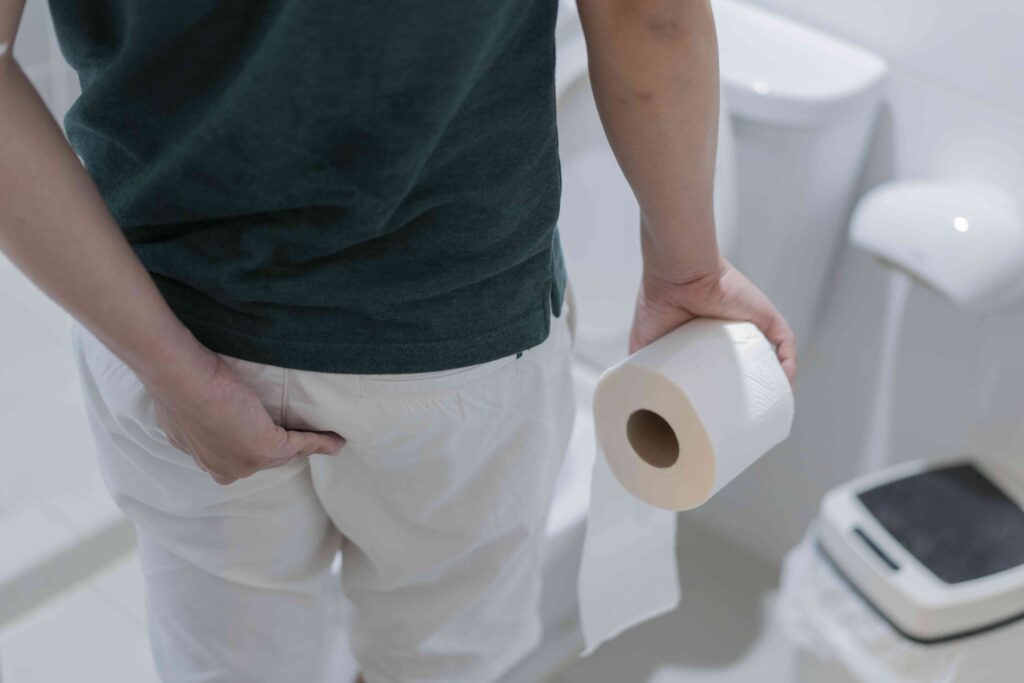:max_bytes(150000):strip_icc():format(jpeg)/Health-GettyImages-1384262057-f6600cac1add4a859131046fb92bcec2.jpg)
Stress does not directly cause hemorrhoids, but its health effects may put you at a higher risk of developing the hard, painful lumps in your anus or rectum.
Hemorrhoids, also known as piles, are swollen veins in the anus or rectum. Hemorrhoids may cause pain, itching, and bleeding. They can develop from factors that create too much pressure in the abdomen or pelvic region around these veins.
Stress may lead to hemorrhoids in several ways. When stress affects your digestive system, it can lead to constipation or diarrhea. Feeling overwhelmed can also impact your habits around diet and exercise, and it can increase the muscle tension in your body. All of these are risk factors for hemorrhoids.
Constipation or Diarrhea
Stress can change the balance of your gut microbiome, the bacteria and other helpful organisms in your intestines. It can also slow down or speed up the rate at which food moves through your digestive system. These changes can often disrupt your normal bowel movements, leading to constipation or diarrhea.
Constipation causes trouble passing hard, dry stool. You might sit on the toilet for longer periods or strain to have a bowel movement. Both increase the pressure on the veins around your anus, which increases your risk of hemorrhoids.
Frequent diarrhea can increase the pressure on your anal veins. If you already have hemorrhoids, diarrhea and frequent wiping may irritate the skin around your anus, worsening hemorrhoid symptoms.
Poor Diet
Many people commonly use food as a means to cope with stress. You might eat more than usual or turn to low-fiber comfort foods, but getting enough fiber is important for maintaining healthy digestive function. A change in your eating habits may change your bowel movements, increasing the risk of hemorrhoids.
Lack of Exercise
Stress can decrease your motivation to exercise, and a lack of physical activity can make you more likely to develop hemorrhoids.
Exercise can help regulate your bowel movements, maintain proper blood flow, and strengthen the pelvic muscles involved in pooping. Not getting enough exercise can also lead to constipation, increasing the risk of hemorrhoids.
Muscle Tension
Emotional stress can contribute to physical tension. This tension can cause muscle contraction in or near your anus, increasing the pressure in your rectal area. Over time, increased pressure on your veins in this area can cause hemorrhoids.
Managing stress is crucial for your overall health, and it may help you prevent hemorrhoids. Effective stress management techniques include:
- Mindfulness and meditation: Practicing mindfulness or meditation can help calm your mind and reduce stress. They may also involve deep breathing to help you relax.
- Exercise: Find exercise you enjoy rather than exercise you think is a chore. Enjoyable exercise can help reduce stress.
- Sleep: Getting at least seven hours of quality sleep per night can help you cope better with stress. Try to keep to a consistent schedule, going to bed and waking up at the same time each day.
- Social support: Making time to see friends or family who support you is an important stress reliever. Find connection and comfort in community or spiritual groups.
- Other forms of self-care: Many people benefit from additional self-care methods, like social media breaks, time outdoors, or journaling.
Preventing hemorrhoids involves managing stress effectively and maintaining your digestive health. Along with stress-reducing habits, healthy gut habits involve a balanced diet, exercise, and bowel regulation.
Dietary Habits
Eating foods with a lot of fiber can help prevent both constipation and diarrhea, making stool easier to pass. Focus on fruits, vegetables, and whole grains, and limit processed foods, meat, and full-fat dairy. Make sure to drink plenty of water or other clear liquids. Staying hydrated helps fiber work better.
Experts recommend getting 25-30 grams of fiber per day. Consider a fiber supplement if you have trouble getting enough fiber from your diet.
Exercise Habits
Getting enough exercise helps regulate your bowel movements. Aim for 20-60 minutes of exercise, three to five days per week. Good exercises to focus on include aerobic exercises, like walking, jogging, or swimming.
While getting plenty of physical activity is important, certain exercises may actually put you at higher risk for hemorrhoids. Lifting heavy weights can increase the pressure on the veins around your anus. You may want to avoid activities like cycling, rowing, and horseback riding, which can irritate your anus and increase your risk of hemorrhoids.
Bowel Training
Developing a consistent routine for your bowel movements may help you avoid hemorrhoids. Healthcare providers call this bowel training. It includes these strategies:
- Try to have a bowel movement at the same time each day
- Give yourself plenty of time to use the toilet
- Go as soon as you feel the need
- Avoid straining or sitting for long periods on the toilet
- Use a bathroom footstool for a more comfortable bowel movement
Stress can have wide-ranging effects on your body, lifestyle, and bowel habits. Stress-induced constipation or diarrhea, diet changes, lack of exercise, and muscle tension may all increase your risk of developing hemorrhoids. You can help prevent hemorrhoids by managing your stress levels, eating enough fiber, getting exercise, and maintaining good bowel habits.



